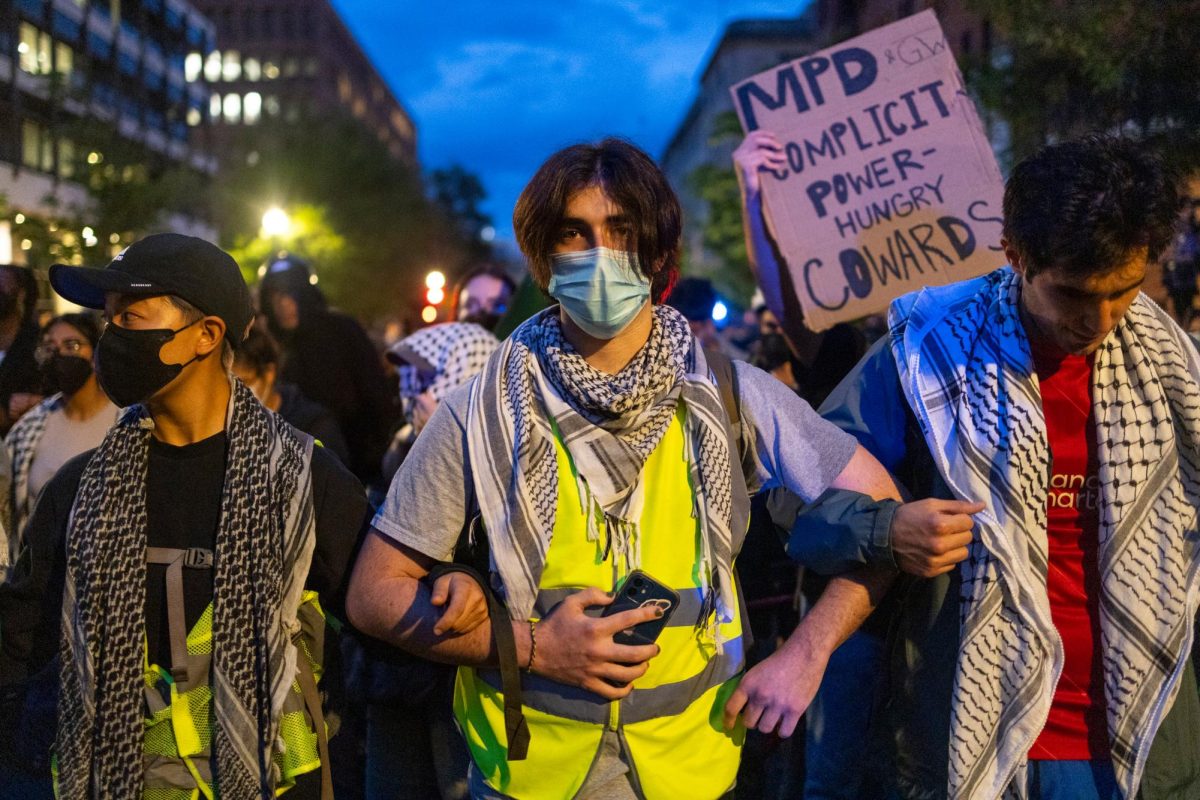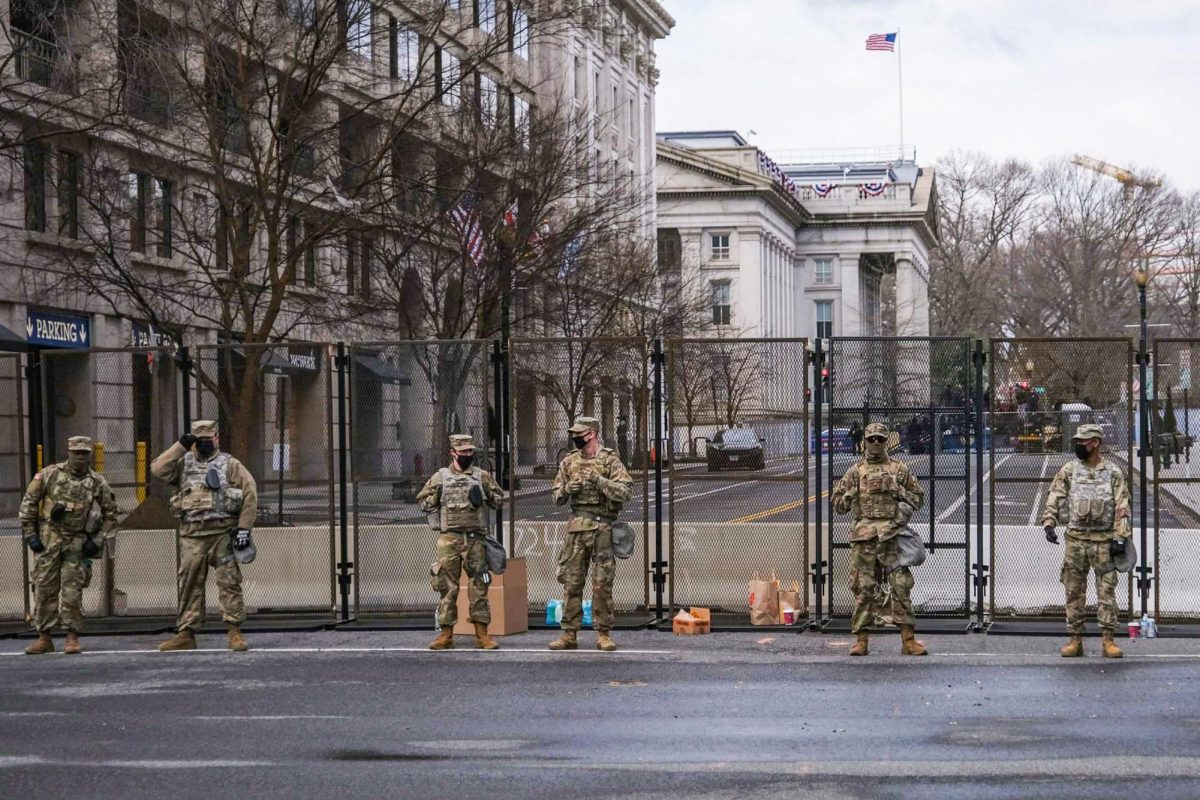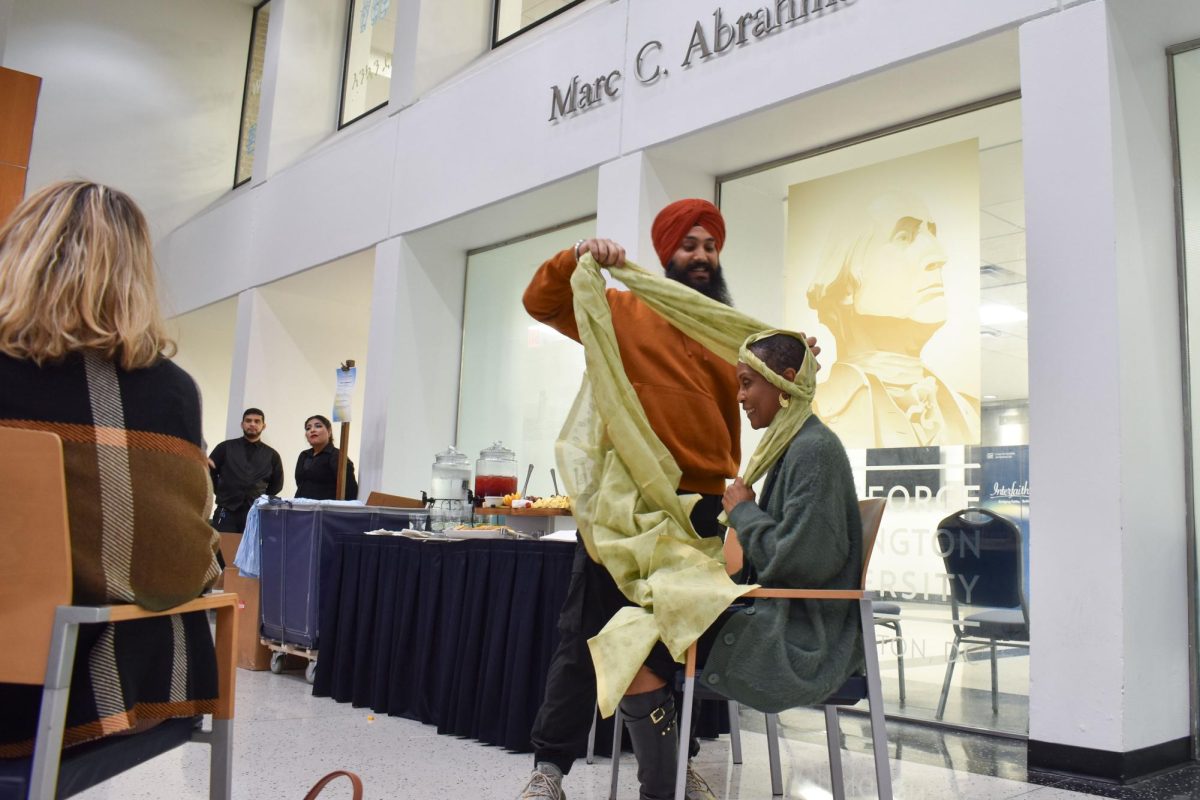In the three months following students’ arrests at the pro-Palestinian encampment on campus in May, legal organizations, student groups and alumni have urged federal attorneys and University officials to drop federal and student conduct charges.
Of the 33 people local police arrested for unlawful entry or assault on a police officer after encamping in University Yard to protest Israel’s war in Gaza, six GW students began their federal court proceedings May 15, a week after the clearing. A coalition of pro-Palestinian GW student organizations alleged in late June that the University charged at least 13 students and 10 student organizations “without evidence” for their involvement in the encampment for Code of Student Conduct violations.
Students and community members erected tents in U-Yard on April 25, demanding officials drop disciplinary charges that officials allegedly issued to pro-Palestinian organizations and students in February, divest from weapons manufacturers, disclose all endowments and investments and end all academic partnerships with Israel. Hundreds of Metropolitan Police Department officers descended on U-Yard early in the morning of May 8 to clear the encampment, ending the nearly 14 day demonstration.
In the wake of the clearing, students, alumni and legal firms have criticized federal prosecutors and GW officials for their response to pro-Palestinian activism in Instagram posts, op-eds and press conferences that began the day after MPD officers arrested the students. The community members have publicly called on GW to drop any student conduct charges against students, arguing that officials are using discriminatory tactics to target individuals involved with the movement for Palestinian liberation as a tactic to deter participation on campus.
The Student Coalition for Palestine at GWU alleged late last month that GW officials pressured the U.S. District Attorney for D.C. to revoke previous legal agreements that allowed five of the arrested students to enter public spaces in Foggy Bottom and replaced them with harsher agreements that banned the students from stepping foot on the entirety of campus for six months.
The coalition refers to the GW students facing legal proceedings as the “GW 5.” It is unclear if additional arrested students are at risk of prosecution from the U.S. District Attorney for D.C. A University spokesperson said in May that MPD arrested six GW students.
“From pepper spraying and brutalizing students, to suspending students en masse, banning organizations, allowing students to be doxxed, harassed, and assaulted, and slandering this school’s own students, GW has served as an example to the entire nation of how a University can brutalize and discriminate against its own students and faculty in pursuit of Zionist interests,” a coalition Instagram post from Saturday reads.
Stay-away orders
Two days after local police cleared the pro-Palestinian encampment, the GW Police Department sent “all subjects taken into custody” initial stay-away orders as a pretrial condition that allowed them to access spaces that are not owned by GW in and around campus, including the areas that house Sweetgreen, Tonic and CVS, according to a letter sent to an arrested student that was obtained by The Hatchet.
The Student Coalition for Palestine at GWU said late last month that GW’s Vice President and General Counsel Charles Barber asked federal prosecutors to issue new legal agreements that would ban five GW students without exceptions from the entirety of the Foggy Bottom Campus for six months. The prosecutors are responsible for determining criminal charges and prosecuting cases in court after hearing arguments from the defense attorneys representing the people that MPD arrested.
A representative from the coalition, who requested to be anonymous due to fear of retaliation from the University, claimed earlier this month that prosecutors revoked the exceptions that allowed arrested students to access publicly owned spaces initially outlined in the pre-trial stay-away orders on July 17 — 10 minutes before some arrested students attended a second round of status hearings for their cases in the U.S. Superior Court for D.C.
“The orders would prevent students from attending classes, living on campus, accessing all University spaces including dining halls and cultural services, passing through the campus on the bus or metro, or even walking on public streets,” a coalition Instagram post in late July states.
The representative said a group of five legal firms sent a letter earlier this month to Barber demanding that GW asks U.S. District Attorney for D.C. Matthew Graves to drop the expanded stay-away orders against five GW students arrested at the encampment. The representative said the firms included the American Friends Service Committee, Arab-American Anti-Discrimination Committee, Center for Protest Law and Litigation at Partnership for the Civil Justice Fund, Council on American-Islamic Relations and Palestine Legal.
Palestine Legal previously filed a complaint against GW in 2023 with the Department of Education’s Office for Civil Rights on behalf of three students, claiming the University has fostered a hostile environment toward Palestinians which prompted the office to open an ongoing investigation.
The U.S. Attorney’s Office for D.C. did not return multiple requests for comment on the allegation that GW officials pressured federal prosecutors into revoking previous legal agreements.
A University spokesperson said D.C. is responsible for determining the conditions of plea agreements, including whether to impose a stay-away order on the individuals and the scope of the order. The spokesperson said GW told D.C. officials that any student who has not been suspended by the University should be able to attend classes on campus, even if the city chooses to charge them with stay-away orders.
“GW’s position, which it previously expressed to the District of Columbia, is that if it wishes to impose a stay-away order, any enrolled student who has not been suspended by the University should be able to attend classes on campus,” the spokesperson said in an email.
The coalition said GW suspended seven students for nine counts of disciplinary misconduct on the second day of the encampment. A University spokesperson said in April that temporary suspensions typically last up to 21 days, while “non-temporary” suspensions typically last at least one semester. The spokesperson added that the University cannot comment on the status or category of individual student conduct cases.
The coalition representative said the legal firms’ letter also lists possible claims for a potential civil case that students “may have” against the University regarding their yearslong response to pro-Palestinian campus advocacy. The representative said the letter also asks that officials pause the University’s student conduct cases allegedly filed against the students involved in the encampment to allow negotiations between the parties to take place.
Students and alumni protest University, prosecutor encampment response
Coalition members spent the summer advocating for arrested students through virtual and in-person court support and social media posts and worked to encourage the GW and D.C. community to call on the University and prosecutors to drop student conduct charges and criminal charges against student protesters.
A coalition Instagram post on July 27 called on community members to flood the phones and inboxes of the Offices of the Provost, General Counsel and Conflict Education & Student Accountability to demand that GW asks federal prosecutors to drop the orders issued against the five students.
The coalition also called on supporters to attend the virtual court hearings for arrested protesters in May and encouraged people to protest outside of the D.C. Superior Court in July for arrested demonstrators’ first in-person court appearance. The representative from the coalition said the five arrested students also had a court appearance Aug. 1.
The coalition disseminated information throughout the summer via their Instagram account, which more than 9,000 people follow, and through the DMV Coalition account — a coalition of Students for Justice in Palestine chapters across D.C., Maryland and Virginia — which about 11,300 people follow.
Alumni For Justice in Palestine at GW have also called on fellow alumni to show solidarity with pro-Palestinian students by sending a letter to the administration demanding that officials ask prosecutors to drop the stay-away orders. The alumni group similarly alleged in an op-ed published in Mondoweiss earlier this month that the University pressured prosecutors into expanding and extending students’ original stay-away orders.
The op-ed argues that GW’s alleged pressure on prosecutors is another example of the “long imposed restrictions” on pro-Palestinian speech on campus. In the op-ed, the alumni argue that GW has “sponsored zionist intimidation” for years, pointing to the University allowing members of the Canary Mission — a website that doxxes people and organizations on college campuses that it considers antisemitic or anti-Israel — on campus in 2018.
The op-ed also points to GW Hillel hosting Doron Tenne, a former intelligence officer for the Israeli military, in 2022, and GW’s “lackluster” response to a doxxing truck that exposed the names and faces of pro-Palestinian student on campus in November.
“Their actions reveal a disturbing pattern of hypocrisy and racism, where the struggle for Palestinian life is not only marginalized but actively erased from academic life,” the op-ed reads.
Council on American-Islamic Relations report
The Council on American-Islamic Relations — one of the five legal organizations who reportedly sent the letter to GW’s general counsel earlier this month — released a report Wednesday that identified GW, the University of California, Los Angeles and Emory University as three institutions of “particular concern” where Palestinian, Muslim, Arab, Jewish and other students and faculty who oppose the war in Gaza face backlash from their university administrations.
The council argues in the report that GW has failed to protect its students from religious, racial and ethnic discrimination and has suppressed the free speech of students protesting against the war in Gaza. The report states that University President Ellen Granberg has made public statements before the encampment that focused on condemning Hamas’ Oct. 7 attack on Israel while “refusing to acknowledge” the Israeli government’s subsequent and ongoing assault in Gaza and its respective impact on Palestinian, Arab and Muslim students.
Following Hamas’ Oct. 7 attack on Israel, Granberg said in an Oct. 9 statement she was “deeply shocked and saddened” by the “attack on Israel,” and condemned a vigil students held on Oct. 10 for Palestinians killed in the war as a “celebration of terrorism” two days later. Over the next few months, Granberg began condemning both antisemitism and Islamophobia on campus. In a statement to community members on Jan. 25, she launched a plan that detailed officials’ strategies for “fostering productive dialogue” and strengthening support for both sides.
On day 11 of the encampment in the spring, she said in a message that the “dire humanitarian crisis” occurring in Gaza must be addressed, adding that she is “personally grief-stricken” by the suffering and loss of innocent lives occurring on both sides of the conflict.
The report states that GW’s unjust treatment of Palestinian, Arab and Muslim students continued during the encampment months later, including when Granberg called on local police to clear the student protest fewer than 24 hours after demonstrators erected their tents. The report also states that administrators have reportedly attacked students, pointing to a video from April 29, when Provost Chris Bracey appeared to grab the phone of a student protester while walking through U-Yard.
“Rather than defend their own students against anti-Palestinian racism and Islamophobia, university administrators apparently turned their attention to targeting anti-genocide student protesters,” the council’s report reads.
Chris Godshall-Bennett, the legal director at the American-Arab Anti-Discrimination Committee, said in a press conference Wednesday about the report that GW has been a “particularly brutal example” of an institution that has leveled students with “extreme” disciplinary charges for their involvement in pro-Palestinian protests on campus, pointing to allegations that the University revoked the seven suspended students’ housing before holding any conduct hearings.
“It was very clear during the process that GW had no intention of really doing anything other than punishing these students,” Godshall-Bennett said at the press conference.





